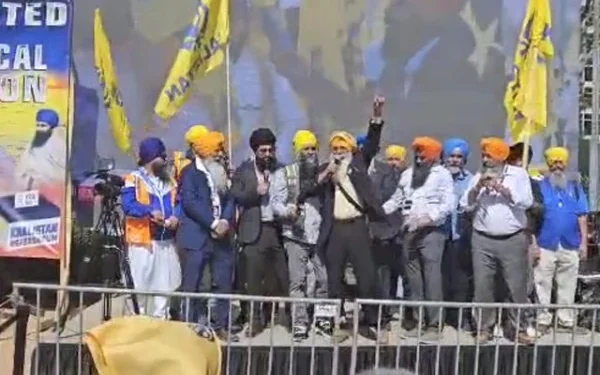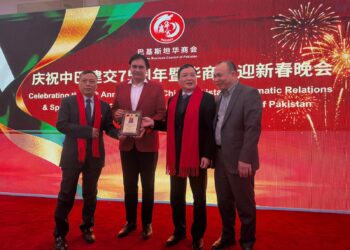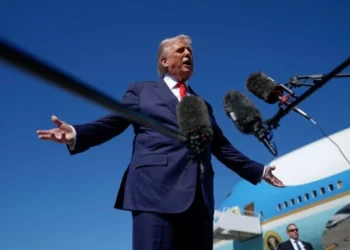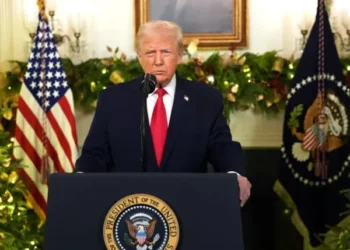Los Angeles Witnesses Historic Sikh Referendum for Khalistan
LOS ANGELES: In a significant development for the Khalistan movement, a referendum advocating for the secession of Punjab from India was successfully held in Los Angeles, California, USA. Thousands of Sikhs from various states across America gathered to cast their votes in favor of an independent Sikh state, reinforcing the movement’s growing momentum on an international scale.
Massive Turnout at the Khalistan Referendum in Los Angeles
The referendum, organized by Sikhs for Justice (SFJ), took place at the Civic Center in Los Angeles, where polling began at 9:00 AM and continued throughout the day. The overwhelming participation of Sikhs from across the United States underscored the community’s strong desire to establish Khalistan, an independent state separate from India.
According to reports, more than 35,000 Sikhs exercised their right to vote, demonstrating their unwavering commitment to the cause. The significant turnout is being hailed as a testament to the growing demand for Khalistan among Sikhs worldwide.
Sikh Leaders Condemn Indian Government’s Actions
During the referendum, prominent Sikh leaders addressed the media and delivered fiery speeches against the Indian government, specifically targeting Prime Minister Narendra Modi’s administration. They accused the Indian government of orchestrating attacks against Sikh activists in the United States, Canada, and other countries in an attempt to suppress the Khalistan movement.
Gurpatwant Singh Pannu, the leader of Sikhs for Justice (SFJ) and one of the key figures in the Khalistan referendum campaign, stated that the attacks on Sikh activists were clear indicators of India’s desperation to silence the movement. He emphasized that despite these threats, the struggle for an independent Khalistan would continue and only grow stronger.
Sikhs Vow to Fight for Khalistan through Democratic Means
Sikh leaders reiterated that their demand for Khalistan is a legitimate right to self-determination and that they will continue their fight through democratic means. “The Sikh community is united in its resolve to achieve Khalistan. The Indian government’s oppressive tactics will not deter us,” said one of the organizers.
Gurpatwant Singh Pannu further stated that the referendum’s success in Los Angeles sends a powerful message to the Indian government that Sikhs worldwide do not wish to remain under Indian rule. “India’s bullets will now be answered with votes,” he declared, reaffirming the community’s commitment to using peaceful and democratic methods to achieve their goal.
Global Implications of the Khalistan Referendum
The Khalistan referendum movement has gained international traction in recent years, with similar referendums held in Canada, the United Kingdom, and other countries with large Sikh diasporas. The Los Angeles referendum marks another major milestone in the global Khalistan movement, further amplifying calls for Punjab’s secession from India.
The Indian government has repeatedly condemned these referendums, calling them an attack on the country’s sovereignty and unity. However, the participation of thousands of Sikhs in these votes indicates growing discontent within the Sikh community regarding India’s treatment of Punjab and its people.
Next Referendum Set for Washington, D.C.
Following the successful conclusion of the Los Angeles referendum, Gurpatwant Singh Pannu announced that the next voting session would take place in Washington, D.C., on August 17, 2024. He expressed his gratitude to the U.S. authorities, particularly the Trump administration, for allowing the referendum to proceed without interference.
“The support we have received from international governments is a sign that our movement is being recognized on a global level. The Khalistan movement is not just a regional issue but a matter of fundamental human rights,” Pannu stated.
The Khalistan Movement: A Historical Perspective
The demand for Khalistan, an independent Sikh homeland, dates back to the post-independence era of India. The movement gained momentum in the 1980s, particularly after Operation Blue Star in 1984, when the Indian Army stormed the Golden Temple in Amritsar, the holiest Sikh shrine. The military operation led to the deaths of hundreds of Sikhs and fueled anti-government sentiments within the community.
Subsequent events, including the assassination of Indian Prime Minister Indira Gandhi by her Sikh bodyguards and the ensuing anti-Sikh riots of 1984, further intensified the Khalistan movement. While armed resistance diminished over time, the idea of Khalistan has remained alive among the Sikh diaspora, which continues to campaign for an independent Punjab through peaceful and democratic means.
India’s Response to the Khalistan Movement
The Indian government has maintained a firm stance against the Khalistan movement, labeling it a separatist agenda backed by foreign forces. Indian authorities have also banned Sikhs for Justice (SFJ) and declared Gurpatwant Singh Pannu a “terrorist” under India’s anti-terrorism laws.
New Delhi has urged international governments to take action against pro-Khalistan activists operating abroad, arguing that their activities threaten India’s territorial integrity. However, Western governments have largely upheld the democratic right to peaceful advocacy and referendums, allowing such events to take place in countries like the United Kingdom, Canada, and the United States.
Conclusion: A Growing Movement with Global Support
The successful Khalistan referendum in Los Angeles marks another milestone in the long-standing struggle for Sikh self-determination. With thousands of Sikhs actively participating in the vote, the movement is gaining increased recognition and legitimacy on the global stage.
As the referendum campaign moves to Washington, D.C., in August, it remains to be seen how India and the international community will respond to the growing call for an independent Sikh state. What is clear, however, is that the Khalistan movement continues to gain momentum, and Sikhs worldwide remain determined to pursue their vision of an independent homeland through democratic means.

























